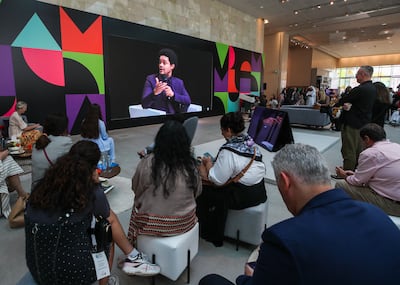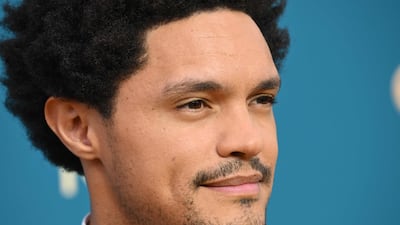The fluidity and evolutionary nature of Abu Dhabi’s cultural identity is something that has long fascinated Trevor Noah, with the South African comedian saying the UAE capital approaches notions of identity much like he does himself.
“I’ve always enjoyed coming out here,” he said at a talk during the Culture Summit Abu Dhabi, which started on Sunday. “After many, many years, I’ve loved seeing a place take its identity, shape and grow over time. Try to reimagine what that identity means. Think about how that identity is impacted by the past and will shape the future.”

Noah is, of course, a bit of a one-man culture summit himself. While starting as a stand-up comedian, he is now also a bestselling author, producer, political commentator, actor and soon-to-be former host of The Daily Show. While his professional identity can be a bit mercurial to box down, Noah said he’s always been used to existing outside canonical categorisations — something that ultimately helped inform his career and worldview.
“Performing stand-up comedy, the idea that some people have is that you are taking centre stage,” he said. “How I view it is me echoing the culture I’m existing within, the people that I’ve grown up with, the world I’m living in. I grew up in a very mixed family, in a very mixed country. What happened over time is that I learnt how to transfer information between people, how to send messages between groups who don’t necessarily communicate in the same wavelength.”
Noah was born in Johannesburg during the apartheid era. His mother is Xhosa, an ethnic group that is the second-largest in South Africa. His father is of Swiss-German ancestry. Their union was illegal under apartheid law, which prohibited relationships between white and black races. In his 2016 autobiography Born a Crime, Noah reflects upon his background, highlighting how the moment he was born, his very existence was deemed an act of immorality.
“Identity is a really fascinating concept,” he said at the summit. “It’s one I’m continuously grappling with and speaking with people about. How do you see yourself and how do others see you? I grew up in a country where we were told who we are meant to be because of the colour of our skin. Once apartheid ended, South Africa found itself in a moment in time where it was allowed to define itself. What that came with was a challenge. What is identity? Which identities do we celebrate? How do we celebrate them, and why? I've lived my entire life with that challenge, and it's been a gift on the other side.”
Another existential quandary, Noah said, was balancing his artistic self with his public persona. Artists can exist in complete anonymity, creating their art and living the way they wish to. As a public figure, that changes.
“I do believe there is a responsibility that comes with acknowledging the fact that people can hear what you're saying and see what you’re doing. It is the difference between the public and the private — it means there are times when you’ll be interacting with more people than just outside your vicinity. There is a responsibility, but it's the same responsibility that comes with anybody in public. You know, there are certain things that you don't do in public, because you understand that you are affecting people around you.”
Noah credits much of his success with the education that his mother sought to afford him. The school he attended, Maryvale College, he said, was beyond his family’s means, and helped him lay the foundations of his career. It is something he hopes to pay forward through his developmental initiative, the Trevor Noah Foundation, which he founded in 2018. The initiative helps youth in Johannesburg prepare for higher education or entry into the workforce.
“My aim was to help,” he said, of the reasons he began the foundation. “I didn't know how I would help, why I would help, I just knew that I wanted to help. Following my passion, I realised that there is nothing that has shaped the success of my family more than education. The only reason my family is where it is today is because my mother was taught subjects by a missionary in South Africa, who shouldn't have been teaching those subjects to black students, according to what the apartheid government deemed."
All of this meant his career has taken him to new heights and Noah recently announced he will be ending his tenure as host of world-famous The Daily Show in December. The comedian has been the face of the late-night television programme since 2015. At the Culture Summit Abu Dhabi, he was cryptic about what his next plans are, but did stress he is looking forward to the downtime.
"The first thing I'm going to do next is breathe. Oh, genuinely, I'm gonna breathe," he said. "I'm going to take my time. I'm going to appreciate what this moment in my life has been. It's been a chapter in my life."
Scroll through the gallery below to see photos from the first day of the Culture Summit Abu Dhabi


















































